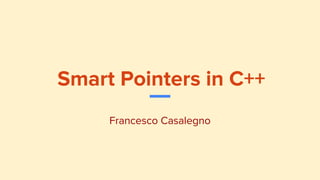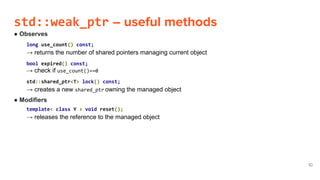The document discusses the dangers of using raw pointers in C++, highlighting issues such as memory leaks and undefined behavior. It introduces smart pointers as a safer alternative, explaining the types: std::unique_ptr for exclusive ownership, std::shared_ptr for shared ownership with reference counting, and std::weak_ptr for non-owning references. Additionally, it recommends using factory functions like std::make_unique and std::make_shared to prevent memory management issues.

![Raw pointers are dangerous!
● In C++ we use pointers to handle memory that was dynamically allocated with new.
However, raw pointers can be dangerous for many reasons.
2
Person* p = new Person("John", 25);
p->call(); // exception may be thrown here...
delete p; // ... and we never get here!
→ Missing delete causes memory leaks.
This easily happens when exceptions are not correctly handled.
→ Calling delete more than once yields undefined behavior.
Person* p = new Person("John", 25);
Person* q = p;
delete p;
delete q; // undefined behavior: object already deleted!
→ After a delete we get a dangling pointer.
Person* p = new Person[10];
delete[] p; // p still points to the same memory location!
p[0]->call(); // undefined behavior!
p = nullptr; // ok, now p is not dangling any more](https://image.slidesharecdn.com/smartpointers-170401144012/85/Smart-Pointers-in-C-2-320.jpg)
![Smart Pointers
● You can avoid these drawbacks by using smart pointers.
A smart pointers is a wrapper of a raw pointer providing same functionalities with more safety:
→ same syntax as raw pointers for deferencing: *p, p->val, and p[idx]
→ automatic management of dynamically allocated memory lifetime
→ exception-safe destruction
→ automatically set to nullptr, avoiding dangling pointers
● We have 4 kinds of smart pointers, all defined in the header <memory>
→ std::auto_ptr (from C++98) was a first naive attempt to implement a smart pointer with
exclusive-ownership. It is deprecated from C++11, and removed from the STL from C++14.
→ std::unique_ptr (from C++11) is a smart pointer used for exclusive-ownership
that can be copied only with move semantics.
→ std::shared_ptr (from C++11) is a smart pointer used for shared-ownership with automatic
garbage collection based on a reference count.
→ std::weak_ptr (from C++11) is a smart pointer used for observing without owning. It is similar to
std::shared_ptr, but it does not contribute to the reference count. 3](https://image.slidesharecdn.com/smartpointers-170401144012/85/Smart-Pointers-in-C-3-320.jpg)
![std::auto_ptr
● An auto_ptr provides exclusive ownership for a pointer that it holds. When auto_ptr is destroyed, the
object pointed is also automatically destroyed through a call to delete.
● Introduced pre C++11, so no move semantics: how to copy the pointer while keeping exclusivity?
Workaround: c-tor and assignment receive by value and steal the ownership!
● This (deprecated) smart pointers clearly had many issues:
→ when it gets destroyed it always call delete, so no dynamic arrays (delete[])
→ copy / move c-tor and assignment take arguments by non-const argument (same behavior for
lval or rval) and have strange side-effects (stealing ownership): does not respect the natural
requirements of CopyConstructible and CopyAssignable
→ therefore it cannot be used in STL containers (pre C++11) or it is deprecated to do it (C++11)
... If you have C++11, then just use std::unique_ptr instead!
4
{
std::auto_ptr<Person> p(new Person("John", 25));
p->call(); // if exception is thrown, delete is automatically called
} // here p goes out of scope, delete is automatically called
std::auto_ptr<Person> p("John", 25);
std::auto_ptr<Person> q = p; // copy c-tor: q points to object, p is nullptr!
p = q; // copy assignment: p points to object, q is nullptr!](https://image.slidesharecdn.com/smartpointers-170401144012/85/Smart-Pointers-in-C-4-320.jpg)
![std::unique_ptr
● A unique_prt u provides exclusive ownership for the pointer p that it holds. When u is destroyed, the
object pointed by p is disposed using p’s associated deleter (custom of default delete/delete[] )
● Main difference with respect to auto_prt:
→ copy c-tor and assignment are deleted, so that copying from lvalue is not allowed
→ move c-tor and assignment are implemented to allow ownership change by natural move semantics
5
std::unique_ptr<Person> p(new Person("John", 25));
std::unique_ptr<Person> q = p; // compiler error! copy c-tor is deleted
std::unique_ptr<Person> q = std::move(p); // ok, move c-tor called
p = q; // compiler error! copy assignment is deleted
p = std::move(q); // ok, move assignment called
● Important features:
→ template specialization unique_prt<T[]> to handle dynamic arrays
→ copy from lvalue is deleted, copy from rvalue is implemented using move semantics
so that it can suitably work in a STL container
→ custom deleter can be provided if needed
→ pretty simple wrapper implementation, so no overhead in memory (unless custom deleter) or runtime
→ easy conversion to shared_ptr
John
Alice](https://image.slidesharecdn.com/smartpointers-170401144012/85/Smart-Pointers-in-C-5-320.jpg)

![std::shared_ptr
● A shared_ptr provides shared ownership: many pointers may own the same object and the last one
to survive is responsible of its disposal through the deleter.
● This garbage collection mechanism is based on a reference counter contained in a control block.
Each new shared owner copies the pointer to the control block and increases the count by 1.
● Important features:
→ until C++17 no template specialization shared_prt<T[]> to handle dynamic arrays
→ custom deleter and custom allocator (for internal data allocation) can be provided if needed
→ it is CopyConstructible and CopyAssignable, so it can work in a STL container
→ non-trivial implementation and memory overhead (typically 2 pointers: object itself + ctrl block)
→ many operations require atomic (thread safety!) update of ref_counter, which may be slow
→ aliasing c-tor allows to share ownership on an object and point elsewhere (e.g. object’s member)
7
std::shared_ptr p(new Person("John", 25)); // construction: ref_counter=1
std::shared_ptr q = p; // new owner: ref_counter=2
std::shared_ptr r = std::move(p); // r steals ownership: ref_counter=2
p.reset(new Person("Alice", 23)); // p resets managed object: ref_counter=1
r = nullptr; // move assign to nullptr: ref_counter=0,
and deleter is called!
ptr to obj
shared_ptr
“John”
25
ref_counter
custom del
custom alloc
ptr to ctrl
John
object controller](https://image.slidesharecdn.com/smartpointers-170401144012/85/Smart-Pointers-in-C-7-320.jpg)

![std::weak_ptr
● A weak_ptr tracks without owning a pointer to an object managed by a shared_ptr. It implements weak
ownership: the object needs to be accessed only if still exists, and it may be deleted by others.
If we need to access the object we have to convert it into a shared_ptr.
● Used as observer to determine if the pointer is dangling before converting to shared_ptr and using it.
Typical use cases are implementing a cache and breaking cycles:
Example with cycles: how to do if A and C share ownership on B, but B must also point to A?
→ raw ptr: if A gets destroyed, B has no way to know it and its pointer dangles
→ shared_ptr: if C gets destroyed we still have a cycle and therefore A and B are never deleted!
The only reasonable solution is weak_ptr!
● Important features:
→ cannot directly access the pointed object: *p, p->val, or p[idx] are not implemented!
→ convert to shared_ptr (after check for dangling!) when you need to access object
→ implemented very similar to shared_ptr, but no contribution to ref_counter update
→ same memory overhead as shared_ptr, and performance penalty for accessing due to
conversion
9
A B C
John Alice](https://image.slidesharecdn.com/smartpointers-170401144012/85/Smart-Pointers-in-C-9-320.jpg)

![Avoid new, use factories
● Using std::unique_ptr and std::shared_ptr avoid memory leaks through automatic life-time
management and garbage collection. Basically, we do not need to call delete any more!
● However, we still need to call new operator when we call the constructor. This is bad for 2 reasons.
→ Since function arguments can be evaluated in any order, if throw() occurs we may have a leak
→ For shared_ptr, calling the c-tor with new inside causes a double allocation (one for the
object itself, one for the control block) and therefore time penalty
● C++ provides us with factories that fix this issue:
→ std::make_unique (from C++14, but implementation is trivial)
→ std::make_shared (from C++11)
→ std::allocate_shared (from C++11, same as make_shared but with custom memory allocator)
● There is a caveat with make_shared. As the allocation is made for object + ctrl block together, as long
as a weak_ptr needs the ctrl block to be alive, the object cannot be destroyed!
11
foo(std::unique_ptr<double[]>(new double[10]), bar(42));
// argument evaluation could be: i) new double[10], ii) bar(42) iii) unique_ptr c-tor
// if at ii) bar(42) throws, no one will call delete[] on the memory allocated during i) !!](https://image.slidesharecdn.com/smartpointers-170401144012/85/Smart-Pointers-in-C-11-320.jpg)

